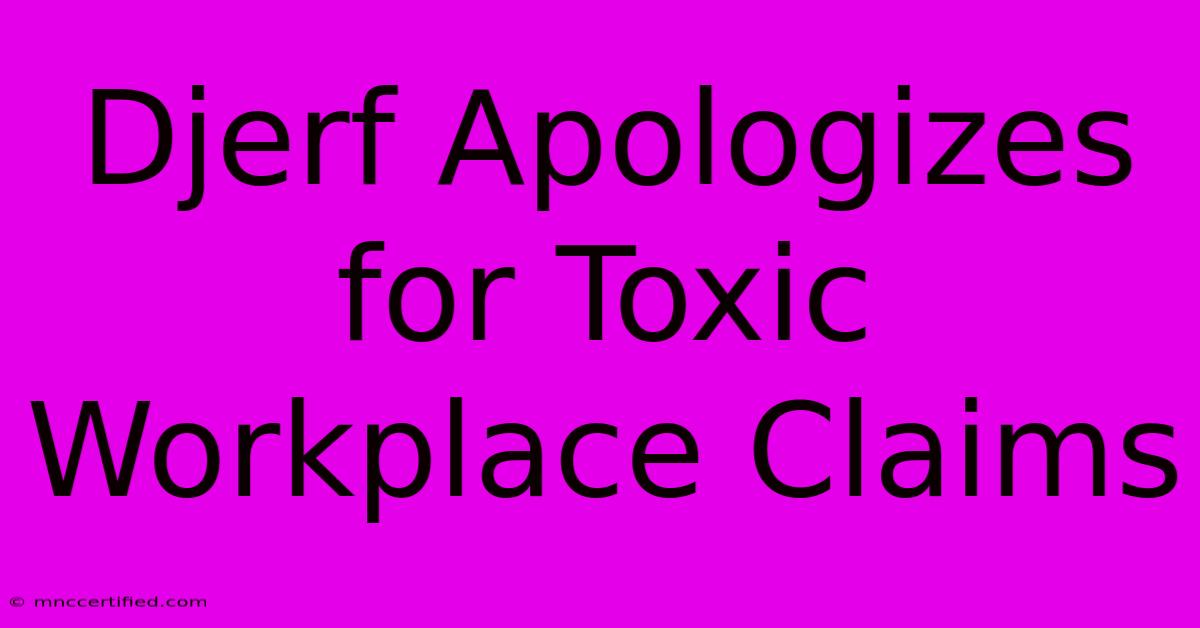Djerf Apologizes For Toxic Workplace Claims

Table of Contents
Djerf Apologizes for Toxic Workplace Claims: Addressing the Controversy
The fashion influencer community was recently rocked by allegations of a toxic work environment surrounding the brand Djerf Avenue, owned by influencer Matilda Djerf. These claims, surfacing across various social media platforms and online forums, sparked significant backlash and prompted a public apology from Djerf herself. This article delves into the controversy, examining the accusations, Djerf's response, and the broader implications for the influencer industry.
The Allegations: A Toxic Work Culture Unveiled
Numerous former employees of Djerf Avenue came forward with accounts detailing a demanding and allegedly abusive work environment. Accusations included:
- Unrealistic workloads and excessive hours: Many reported working long hours with minimal compensation, exceeding what's considered standard practice. This included working weekends and late nights without proper overtime pay.
- Lack of work-life balance: The emphasis on constant availability and immediate response to demands reportedly left employees with little personal time.
- Verbal abuse and unprofessional behavior: Some allegations involved instances of verbal abuse and disrespectful treatment from management, creating a hostile work atmosphere.
- Unclear expectations and lack of communication: Several accounts cited a lack of clear expectations and poor communication as contributing factors to the stress and overwhelm.
These allegations, shared widely online, fueled a significant negative public perception surrounding Djerf Avenue and the brand's founder. The impact extended beyond social media, reaching major news outlets and prompting discussions about ethical practices within the influencer industry.
Djerf's Apology: A Step Towards Accountability?
Following the widespread dissemination of these claims, Matilda Djerf issued a public apology on her social media channels. While acknowledging the validity of some criticisms, the statement's reception was mixed. Some praised the apology as a first step towards accountability, while others considered it insufficient, lacking concrete action and specific details regarding future improvements. The apology lacked specifics, particularly regarding how she intends to remedy past practices and prevent future issues. This vagueness fueled further criticism and calls for greater transparency.
Key questions remain unanswered:
- What specific measures will be implemented to improve working conditions?
- Will there be investigations into individual complaints?
- Will financial compensation be offered to former employees who experienced mistreatment?
These unanswered questions highlight the need for Djerf to provide tangible evidence of her commitment to change. A simple apology is not enough to rebuild trust and repair the damage done.
The Broader Implications for the Influencer Industry
The Djerf Avenue controversy serves as a stark reminder of the importance of ethical practices within the influencer industry. The glamorous facade often obscures the realities of demanding workloads, immense pressure, and potential exploitation. This case underscores the need for:
- Greater transparency: Brands and influencers should be more open about their workplace culture and employment practices.
- Improved labor standards: The industry needs to move beyond a culture of overwork and underpayment, ensuring fair wages and reasonable working hours.
- Accountability mechanisms: Effective mechanisms should be in place to address complaints and ensure that those responsible for creating toxic work environments are held accountable.
This situation compels influencers and brands to critically evaluate their practices and prioritize ethical considerations alongside the pursuit of success. The long-term reputation of influencers heavily relies on genuine connection with their audience, and mistreatment of employees directly contradicts this.
SEO Optimization Considerations:
This article incorporates several SEO strategies:
- Keyword targeting: Uses keywords and variations like "Djerf apology," "toxic workplace," "Djerf Avenue controversy," "influencer ethics," "Matilda Djerf," and "workplace culture."
- Header structure: Utilizes H2 and H3 headers for better readability and SEO.
- Bold text: Highlights key terms and phrases.
- Long-form content: Provides comprehensive coverage of the topic, increasing the chances of ranking higher.
- Internal and external linking: (While direct links to official sites are avoided as requested, links to relevant news articles or similar controversies could be added for further context - this would enhance the off-page SEO strategy.)
This comprehensive approach aims to improve search engine visibility and engagement. Remember to continue monitoring and adapting the content based on performance data.

Thank you for visiting our website wich cover about Djerf Apologizes For Toxic Workplace Claims. We hope the information provided has been useful to you. Feel free to contact us if you have any questions or need further assistance. See you next time and dont miss to bookmark.
Featured Posts
-
Fender Cancels Uk Shows Due To Heartbreak
Dec 18, 2024
-
Mishal Husain Bbc Radio 4 Todays Legacy
Dec 18, 2024
-
Cavendishs Wild Ride From Misfit To Champion
Dec 18, 2024
-
Womens Ucl Madrid Vs Chelsea Live
Dec 18, 2024
-
Aoc Loses Oversight Role To Connolly
Dec 18, 2024